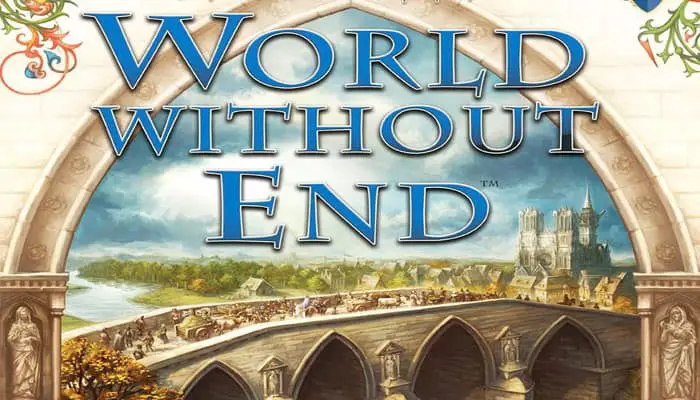
England in the years 1337 to 1361 . . . The momentous events of the English Middle Ages affect the lives of the inhabitants of Kingsbridge.
Here, nearly 200 years ago, Prior Phillip oversaw the building of the imposing cathedral called "The Pillars of the Earth". Now, farmers, wool merchants, and builders-the players-strive for wealth and prestige.
In the process, they encounter numerous and diverse characters from Ken Follett's acclaimed novel. The rivalry between the priory and the city merchants colors the turbulent events of the time.
Players must strike a delicate balance. You earn victory points for a pious and loyal life, as well as taking part in various building projects. You gain prestige caring for the ill during the plague.
However, you still must eat before worrying about honor or glory. Difficult times make food and income hard to come by, especially when the King imposes high taxes to finance his wars. Too often, you keep very little from the money earned at the wool market.
Your success may ultimately lie with the favor of important people. Many trades balance life in the "World Without End".
Components

- 1 game board
- 30 gold markers
- 100 cards
- 57 markers
- 10 die-cut tiles
- 41 wooden resource cubes
- 37 wooden commodity pieces
- 16 wooden house pieces
- 1 wooden start player piece
- 4 wooden scoring tokens
- 4 player screens
- 1 tax die
- 1 bag
- 1 rulebook
Object of the Game
The goal of the game is to score as many victory points as possible. The player whose scoring marker is the furthest along the victory point track at the end of the game wins
Players gain victory points in various ways, primarily by taking part in various building projects and taking care of ill inhabitants.
Setup
For Your First Game: To help you learn how to play, some of the rules for your first game are streamlined. These rules are marked in blue. This will allow you to gradually absorb the mechanics of play without losing the flavor of the game.
Before starting to play, carefully remove and separate the die-cut markers and tiles from the counter sheet.
Place the game board in the middle of the table.
Sit around the table according to the four points of a compass, so that you and the other players are in the North, East, South, and West positions. When playing with fewer than 4 players, it doesn't matter which positions remain open.
You and the other players each choose a color [blue, red, green, or yellow]. You each receive your own set of 12 action cards, with your color on their backs.

For Your First Game: In the first chapter, use only your 6 action cards that have a star in the lower right hand corner.
Place your other 6 actions cards aside. You will use all 12 of your action cards in chapters 2-4 with the full rules for playing action cards.
You each take the 4 houses, 2 donation seals, scoring token, player screen, and summary card in your color.
You and the other players each receive your "starting resources" of 1 wool and 2 gold. You should keep your resources behind your player screen.
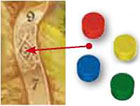 Place all of the scoring tokens on space 8 the victory point track Thus, each player starts the game with 8 victory points.
Place all of the scoring tokens on space 8 the victory point track Thus, each player starts the game with 8 victory points.Place the 25 stone resources [gray] onto the "Quarry" space on the game board. Place the 15 wood resources (brown) onto the "Forest" space on the game board.
Place the 10 grain (yellow) onto the "Field" space in Wigleigh on the game board.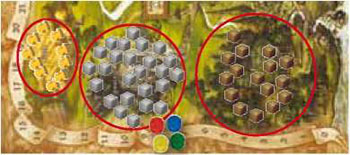
Place the 12 piety markers onto the cathedral.
Place the cloth, wool, loyalty, medical knowledge, and gold next to the game board as a supply.
Shuffle each stack separately. Count out 6 cards from each stack, returning the remaining 5 to the game box. They won't be used in the game. Place the four face down stacks of 6 cards in a row next to the game board.
Place the corresponding chapter card face up at the bottom of each stack. Offset each chapter card so that it is not completely covered.
Place the Bridge building project onto the space intended for it on the game board (it covers up the old, decrepit wooden bridge). You may work on this building project right from the beginning of the game.
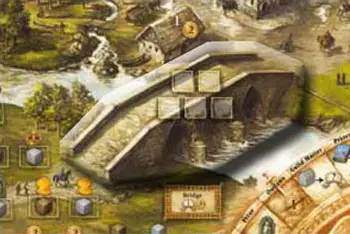
Place the remaining 5 building projects, tax die, metal resource (light blue cube), and 5 covering tiles next to the game board.
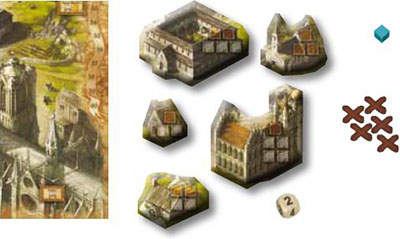
For Your First Game: Do not randomly select the event cards to use for each chapter. Use the 6 event cards for each chapter marked with a star in the lower right hand corner. Place the other 5 event cards back in the box. Then shuffle each s tack and proceed as outlined above.
Place the tower building project between the 'II' and 'III' stacks. Also shuffle and place the 11 plague markers, number side down, between the 'II' and 'III' stacks (same as the Tower).
Place the favor marker onto the first (Outlaws) space of the favor track that runs along the bottom edge of the game board.
Cover the cloth space in the wool market up with a covering tile. In the first chapter ('I'), you may not sell cloth unless an 'I' event card allows you to do so sooner than usual.
The player who last built somethinng is the start player and receives the start player figure.
Game Play
The game takes place over 4 chapters (I through IV), each of which consists of 6 rounds. There are 6 events in each chapter (1 per round].
Each chapter represents a time period of several years, during which you and the other players may take part in various building projects, scoring victory points for them.
At the end of each chapter, you must be able to pay mandatory duties. If you can't, you lose victory points and may face additional penalties.
After chapter II, the city inhabitants become ill with the plague, and you and the other players may take care of them and score victory points.
After chapter IV, the winner is the player with the most victory points.
Playing a Game Round
Each round follows the same sequence:
- Reveal the Topmost Event Card & Resolve Any Immediate Event
- Orient The Event Card
- Receive Personal Income
- Award Favor
- Play 1 Action Card (Take Into Account Applicable Long-Term Events)
1. Reveal the Topmost Event Card & Resolve Any Immediate Event
-

The player with the start player figure is the active player. That player draws the topmost event card from the pile and reads the event text out.
The upper text is flavor text that refers to the novel and doesn't directly impact the game.
The lower text is the event text that affects all players. If it is an immediate event (tan background], its effects are immediately carried out, before the event card is oriented.
If the event gives the players a choice, the active player must decide first, followed by the remaining players in clockwise order. example: When this event card is drawn, each player in clockwise order may decide whether or not to trade in 1 wool for 3 gold.
-

Events with a blue background are long-term events and remain in effect for a longer time, potentially until the end of the 4 chapter. They affect the action cards you play and thus their effects are only resolved later.
2. Orient The Event Card
-
After revealing the event card, you (the active player] place it, face-up, onto the square city council space on the top edge of the game board. The event card orientation affects two elements of the game.
First, it determines each player's personal income for the round. Secondly, it determines whose favor you (the active player] will receive this round (see Award favor, in the next column].
-

You may choose how to orient the event card when it onto the game board-you have 4 options as to how the event card is to be oriented.
Your decision will determine which corner symbol will point to each player as well as how many spaces the favor marker will move.
3. Receive Personal Income
-
Each player now receives, as personal income, whatever is specified by the symbol on the corner of the event card that is pointing in his or her respective direction. For this reason, it is important that players not sit next to each other but rather around the table.
Note: The phrase "personal income" is used in the game only as a convenient term to describe this phase of the game. Medical knowledge, loyalty or piety are of course not income in the typical sense.
Rather, they symbolize what you are doing in the current round. Someone who cares for the ill or reads the relevant books, for example, would gain medical knowledge.
Those who lead a pious life gain piety, while those who remain true to those in the upper echelon of society are rewarded with loyalty.

Example: When the event card is oriented this way, red receives 1 stone, green receives 1 grain, yellow receives 1 gold, and blue receives 1 victory point.
-

You should place your personal income items behind your player screen. This of course doesn't apply to victory points, which are scored on the victory point track.
Should multiple scoring tokens be on the same space of the victory point track, then they are simply stacked on top of each other.
Important: If the personal income that you are supposed to receive isn't available in the supply, you receive 1 victory point instead.
4. Award Favor
-

Each event card has a red direction arrow on one side.
Depending on how the active player chose to arrange the card, this arrow will point to one of the numbers 0 through 3, located around the edge of the city council space.
-
After you and the other players have received your personal incomes, move the favor marker along the favor track the number of spaces indicated by the orientation of the event card.
Example: The direction arrow points to the 2. Move the favor marker forward 2 spaces.

-
You (the active player] then receive an award depending on the space occupied by the favor marker.
Important: If you (the active player) didn't move the favor marker because the event card was oriented to point to the 0, nothing happens. You only receive an award if you moved the favor marker.
The Favor Spaces

Queen: You receive 2 victory points, provided you have at least 1 loyalty.

Prior: You receive 1 piety from the cathedral.

Guild Master: You receive 1 victory point for each house you have built on the game board (with the House Building action, see below).

Prioress: You receive 2 victory points, provided you have at least 1 medical knowledge.

Merchants: You receive 1 wool from the supply.

King: You receive 1 victory point for each loyalty you have.

Earl of Shiring: You receive 1 grain from the field.

Bishop: You receive 1 victory point for each piety you have.

Outlaws: You must pay 1 gold to the supply. If you cannot do this, the event card may not be oriented in this manner.
Note: You don't have to pay any piety, loyalty, or medical knowledge, just show how much you have.
When the favor marker moves past the last space on the top half of the favor track (Bishop), it continues clockwise along the bottom half of the track (to the Queen).
If the award that you are to receive isn't available in the supply, you receive nothing. Unlike the personal income, you do not receive victory points instead.
Note: Should one or more of the favor track spaces be covered up due to an event card's effect, these spaces aren't counted when moving the favor marker forward.
5. Play 1 Action Card
(Take into account applicable Long-term Events)
Starting with you, the active player, each player in clockwise order, plays and resolves 1 action card. You choose that action card from your hand.
Leave the action card you played face-up on the table in front of yourself.
If a blue event card was revealed at the start of the round, you must take it into account when playing your action card. Should there be more than one blue event card along the edge of the game board (from previous rounds), they must all be taken into account.
The Action Cards

Grain: You receive 1 grain from the field.

Piety: You receive 1 piety from the cathedral.

Resource: You receive either 1 stone from the quarry or 1 wood from the forest.

Building Project: You may use up to 2 resources to work on one building project. You receive 3 victory points per resource. You cannot use this action to work on two different building projects - both resources must be used on the same project.
However, you may choose to use two different resources (i.e., a stone and a wood). Most building projects come into the game via event cards. The Bridge building project is already on the board at the start of the game, while the Tower project is only added to the board after chapter II.

Wool & Cloth Sales: You may sell as much wool as you wish at the wool market, along with no more than 1 cloth. Ydu receive 2 gold for each wool sold and 4 gold for the cloth sold. You may sell only 1 cloth if you wish.

Privilege: You repeat the action you carried out in the current chapter's previous round (indicated by the topmost action card in your action pile).
Note: Carrying out the action associated with an action card is voluntary. You may always choose not to carry out the action. Additionally, if you play an action card whose action cannot be carried out, then nothing happens.
Example: You play the Grain action card but there isn't any grain left on the field.
For your first game: The 6 action cards described above have stars on them and are the only 6 cards you'll need for chapter I, giving you a chance to learn how they work.
Starting with chapter ii, you will also have the other 6 action cards previously set aside at your disposal. You will still only play 6 action cards per round, but will now be able to choose from all 12.
You only need to read this section of the rules, concerning choosing cards as well as the descriptions of the other 6 cards, after finishing chapter I.
The Game with all 12 Action Cards

After playing 1 action card, you also choose 1 action card to discard from your hand. Place this card facedown, with no effect, next to your previously-played action card.
Thus, in each chapter, you will only be able to use 6 of your 12 action cards. You will have to forego the remaining 6 actions.
You will end up with two piles in front of yourself: an action pile and a discard pile. Most rounds, each pile grows by one card. At the end of the chapter, all action cards will have been played or discarded. At the beginning of the next chapter, all 12 action cards are once again available to be played.
The 6 other Action Cards

House Building: You pay 1 gold and 1 matching resource (either stone or wood) and build a house on an open space among the 14 building spaces located in the lower left hand corner of the game board.
The type of resource required is indicated by the symbol on the space. Building houses lets you use the House Rent action to gain the income shown above the building space.
Important: You may not build houses on two spaces that provide the same income.

House Rent: You receive income from up to two of the houses you previously built on the game board. If you have more than two houses on the board, you must choose which two you wish to receive income from.
The income available to you is indicated on the building spaces. Some resources, such as piety and grain, may be scarce. If they aren't available, then you don't receive them as income.

Donation: You make a donation to one of the building projects currently on the board.
Pay 1 gold and place one of your two donation seals onto the building project you chose.
Note: Should an event card prohibit further work on a building project, then you may not make a donation to that building project either.

Cloth Production: You may trade in either 1 wool for 1 cloth OR 2 wool for 2 cloth.

Medicine: You have a choice. You may either receive 1 gold and 1 victory point (for minor medical assistance) or, starting in chapter III, care for one (or more) of the plague-infected inhabitants of Kingsbridge.
For that, you receive 2 victory points per inhabitant along with an additional benefit.

Favor: You move the favor marker exactly 1 space along the favor track. You then receive the award indicated by the space the marker is on.
End of the Round

-
If a long-term event was drawn during the current round, you now move it to the first event card space along the upper edge of the game board.
Should that space already be filled, then you fill the second event card space instead.
You may never have more than two event cards along the upper edge of the game board at once. Once both spaces are filled, then the third long-term event drawn will replace whichever previous event has been in effect the longest.
Note: There are never more than 3 long-term events possible in each chapter.
-
You, the start player, give the start player figure to the player on your left (clockwise). That player becomes the active player.
-
The new active player begins the next round by drawing and revealing the next event card. If it is a grey event card, resolve its effects immediately. Once the active player orients the card on the city council space, you and the other players each receive your personal income.
The active player receives the favor award, and finally each player plays one action card (taking into account any long-term events) and discards another action card. 6 rounds are played in this way, after which the chapter ends.
End of a Chapter
After 6 rounds, the chapter ends. Read the text on the appropriate chapter card and carry out the instructions:
Add one matching resource to each building project on the game board to symbolize construction progress. If a building project has both a stone and a wood space free, fill the stone space first.
Remove any covering tiles added to the board due to events. Should the tile covering the cloth market still be on the board at the end of the first chapter, then you remove that tile as well.
Remove all long-term events from the game board. These events have no effect in the new chapter.
Finally, you and the other players must each pay mandatory duties (see below). If you cannot make the payment, then you will lose victory points and have to suffer a penalty at the start of the next chapter.
If you have any piety, grain or gold left after paying duties, you may keep it for use in the next chapter.
You, the start player, give the start player figure to the player on your left.
If you just completed chapter I, where only 6 action cards are used, you and the other players each add the additional 6 action cards to your hands. Play the remainder of the game with the full rules.
After chapter II, place the Tower building project along with the 11 plague markers onto the game board.
The Mandatory Duties
-
 You must show that you have lived a virtuous and pious life. To this end, you must pay 2 piety, returning them to the supply (the cathedral). If you only have 1, pay 1.
You must show that you have lived a virtuous and pious life. To this end, you must pay 2 piety, returning them to the supply (the cathedral). If you only have 1, pay 1.If you haven't been pious enough, you lose 3 victory points for each piety you cannot pay and must perform penance at the start of the next chapter.
-
 Additionally, you must show that you have enough food to sustain yourself. To this end, you must pay 2 grain, returning them to the supply (the field). If you only have 1, pay 1.
Additionally, you must show that you have enough food to sustain yourself. To this end, you must pay 2 grain, returning them to the supply (the field). If you only have 1, pay 1.If you don't have enough food, you lose 2 victory points for each grain you cannot pay and must go begging at the start of the next chapter.
-
 Finally, you must pay taxes to the King. You (the active player) roll the tax die, which determines how much gold each player must pay. The taxation amount varies: pay 2 to 5 gold.
Finally, you must pay taxes to the King. You (the active player) roll the tax die, which determines how much gold each player must pay. The taxation amount varies: pay 2 to 5 gold.If you can't pay your taxes in full, you must pay what you can. You lose 1 victory point for each gold you cannot pay and must go before the royal court at the start of the next chapter.
Penalties
-
Penance: If you have to perform penance because you didn't have enough piety at the end of the previous chapter, you must let another player randomly draw an action card out of your hand at the start of the next chapter.
This card is discarded with no effect. After performing your first action of the chapter, you don't need to discard another action card.
-
Begging: If you have to go begging because you didn't have enough food at the end of the previous chapter, you must forego your personal income in the first round of the next chapter.
-
Royal Court: If you have to go before the royal court because you couldn't pay your taxes in full at the end of the previous chapter, you only get to carry out 5 actions instead of 6 in the next chapter.
At the start of the next chapter, you must play one action card and discard another in the same manner as usual; however you don't get to carry out the associated action.
Going before the royal court replaces your normal action card phase.
Exception: Should the 'King Edward III leads a war against France' event card be the first card drawn in chapter II, then you do not need to discard an additional 2 action cards.
All other players must carry out the event card's effect as usual.
Exception at the end of chapter IV: If you are short grain, piety or gold at the end of the game, you don't have to go begging, perform penance, or go before the royal court. Instead, your victory point losses will be doubled for each missing grain, piety or gold.
Example: If you are missing 1 grain and 2 gold, you don't just lose 4 victory points (2 for the grain and 2 for the gold). Instead you lose double: for a total loss of 8.
Protection Against Penalties

If you pay 1 loyalty, you can avoid one penalty at the end of each chapter, regardless of the amount of your shortfall.
Important: You still lose the victory points.
You can protect yourself against multiple penalties, provided you pay 1 loyalty for each.
Example: You are missing 2 grain and 1 piety. You may pay 2 loyalty and avoid having to go begging and perform penance. However, you may also choose to pay only 1 loyalty and only be protected from one of the two penalties.
Note: The duties associated with the end of a chapter are summarized on the player screens provided for each player. The rules for begging, penance, and the royal court are also summarized on the summary cards.
Building Projects
-
Five building projects come into the game via event cards. As not all event cards are used in each game, it can happen that not all building projects will show up in each game.
There are also two projects, the Bridge and the Tower, that are independent of the event cards. However, the Tower cannot be worked on until the start of chapter III. At that time, place the Tower building project onto the space intended for it on the game board.
-
When a building project comes into the game, place the appropriate building project tile onto the space intended for it on the game board. The building project is depicted on the event card; its name is shown by the appropriate space on the game board.
Example: The Fulling Mill is being built.
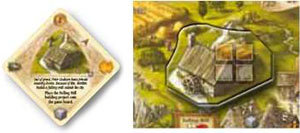
-

When you play your Building Project action card, you can work on one project by placing either 1 or 2 of your own resources onto any free grey or brown building spaces on the building project tile (stone must be placed onto the grey spaces, wood onto the brown spaces).
-
You receive 3 victory points for each building space you fill.
-
When building, you may fill the building spaces up in any order you like.
Example: You place 1 stone and 1 wood and receive 6 victory points.
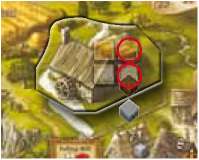
-
Special rules apply to the Tower's final (light blue) space..
Donations
-
When you play your Donation action card, you can make a donation towards a building project (see above). Pay 1 gold and place one of your donation seals onto the building project.
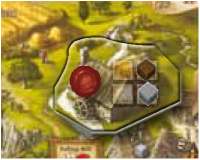
-
When a building project is completed (which means that all its building spaces are filled), each player who made a donation towards it receives the bonus indicated on the game board. In most cases, this consists of 1 victory point along with an additional benefit.
Note: Should insufficient benefit resources be available, all donating players receive nothing.
-
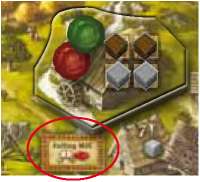
Multiple players may donate towards the same building project. However, you may not make 2+ donations towards the same project.
Example: Red and green each receive 1 victory point and 1 cloth.
-
Once the building project is completed, the donating players get their donation seals back.
-
Players receive 2 victory points for donating towards the Tower and the Chapel of the Virgin Mary; however no additional benefit is awarded.
-

If you donated towards the hospital, you may immediately care for a plague-infected inhabitant, provided that you have sufficient medical knowledge. If multiple players donated towards the Hospital, each player (starting with the active player) gets to care for an inhabitant in turn.
Plague
-
At the start of chapter III, the plague comes to Kingsbridge. In each of chapter III and chapter IVs rounds, the inhabitants of one house may fall ill.
To this end, at the end of chapter II, mix up the 11 plague markers and place them, number side down, onto the 11 numbered locations on the game board: 10 houses and 1 forest hideout indicated by an outlaw (#11).
-
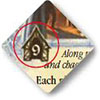
Which particular house's inhabitants fall ill depends on the event card drawn in the round. Each of the 11 event cards for chapters III and IV are numbered from 1 to 11.
When a new event card is drawn, before reading the event text, check to see which of the 11 locations' inhabitants have fallen ill this round. You turn the corresponding plague marker face up. example: The inhabitants of house number 9 have fallen ill.
-

The number on the plague marker shows how much medical knowledge is required to care for them.
The amounts vary from 1 to 5. Example: To care for this house's inhabitants, you need to have at least 3 medical knowledge.
-
To care for the inhabitants of a house, you must play your Medicine action card as well as have sufficient medical knowledge. You show your medical knowledge and specify which location you wish to care for.
-
For each location you care for, you receive 2 victory points as well as a benefit that depends on the location you cared I for. The benefits are indicated by the symbols located at the 1 various locations. The benefits can include victory points, gold, loyalty, cloth, etc.
Example: For house nine, you receive 2 victory points and may immediately build a house on the game board without having to pay 1 building resource and 1 gold.
-
You receive no additional benefit apart from the 2 victory points for caring for the outlaws (11) in the forest hideout.
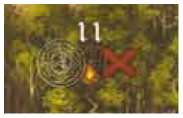
-
Remove the plague marker for the location you cared for from the game.
You return the medical knowledge you used back behind your player screen- you don't need to pay it.
-
If you have enough medical knowledge, you can use the Medicine action card to care for multiple locations. To do so, you need to have medical knowledge equal to or greater than the sum of the locations' requirements.
Of course, when you care for multiple locations you also receive multiple victory points and benefits.
-
Should a number revealed in the chapter IV point to a house whose inhabitants are already ill (plague marker was revealed in chapter III) or who have already been cared for (plague marker was removed from the game), no new illness occurs, since nobody can fall ill from the plague twice.
The Tower
-

The Tower building project is a special case. As soon as its 8 regular building spaces (6 grey and 2 brown) spaces are filled, it is completed by filling the light blue building space at the top of the tower.
The Tower, once completed, is the tallest structure in England.
-
The King rewards the player with the most loyalty with a special metal resource from the royal mines. That player places it at the top of the tower (filling the light blue space) and receives 3 3 victory points.
If multiple players are tied for the most loyalty, then one of them places the metal and each of them receive 1 victory point.
Note: Due to a certain event card, it may be that the Tower is completed immediately.
In this case, fill any remaining spaces with stone from the quarry and wood from the forest, and check to see which player has the most loyalty and award that player the metal building resource and victory points.
-
It may occur that the Tower isn't completed before the end of the game. In that case, the metal isn't awarded.
End of the Game
The game ends after the fourth chapter. After paying your mandatory duties, you and the other players each count up your remaining resources. Each stone and wood you still have is worth 1 victory point.
Every 2 gold you still have is also worth 1 victory point (victory points from gold are calculated by dividing your gold in half). Everything else is worth nothing.
The player with the most victory points is the winner.
You may have half victory points because of dividing your gold holdings in half.
In the event of a tie, the winner is the tied player with the most piety. If there is still a tie, the player with the most loyalty wins, then the most medical knowledge.
Continue Reading

